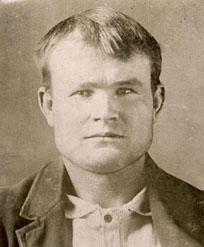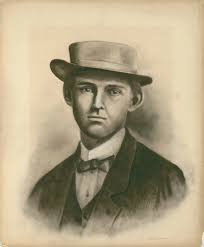Butch Cassidy

Robert LeRoy Parker, better known to the world as Butch Cassidy, squinted into the brilliant sunrise stretching over the Wyoming hills. The year was 1896, and Butch, already notorious as the charismatic leader of the "Wild Bunch," contemplated the life he had chosen—a life marked by daring robberies, narrow escapes, and constant movement.
Butch sat atop his horse, gazing thoughtfully at the railroad tracks snaking through the valley below. Beside him sat Harry Longabaugh, known widely as the Sundance Kid, his trusted partner and closest friend. Together, they formed one of the most infamous partnerships in outlaw history.
"Looks like good weather for a robbery," Sundance remarked dryly, tipping back his hat to reveal piercing eyes filled with equal parts humor and mischief.
Butch laughed softly, his warm, infectious chuckle echoing through the early morning stillness. "You always did have a fine way of lookin' at things, Sundance."
For Butch Cassidy, the outlaw path had never been strictly about the money, though the spoils were significant. Instead, it had always been about freedom—freedom from authority, from conformity, and from the oppressive rules of civilization. It was a romantic view, perhaps, but one he clung to fiercely.
Their target that day was the Union Pacific Overland Flyer, carrying a hefty payroll bound for banks in California. The Wild Bunch, a group composed of loyal friends such as Kid Curry, Ben Kilpatrick, and Will Carver, awaited orders in a secluded valley camp. Butch and Sundance returned there swiftly, bringing with them an air of calm confidence.
"Gentlemen," Butch announced, dismounting effortlessly from his horse, "today's the day we remind the Union Pacific who's in charge."
Cheers erupted, and quickly the gang saddled up, riding hard toward the designated ambush spot. Butch’s careful planning was legendary; he meticulously chose isolated locations, timed to perfection, with clear escape routes into remote terrain.
As the train approached, steam billowing and metal wheels grinding, the men took their positions. Sundance gave Butch a steady nod, signaling his readiness. When the locomotive thundered past, Butch raised his pistol high, fired twice into the air, and the raid commenced.
Swiftly, expertly, they forced the train to a stop, men leaping aboard with practiced precision. Inside the express car, a shaken clerk handed over the locked payroll box without resistance. "Much obliged," Butch said courteously, tipping his hat.
Yet just as swiftly as it had begun, their successful heist became more complicated. A posse appeared, seemingly out of nowhere, their presence indicated by rapidly approaching dust clouds.
"We got trouble, Butch!" Sundance shouted from atop his horse, his rifle already at the ready.
"Ride out!" Butch commanded urgently, securing the money box and vaulting onto his horse. Shots erupted behind them, bullets whizzing dangerously close as the posse gave chase.
The Wild Bunch navigated rocky trails and dense thickets, expertly steering through terrain impossible for the pursuing lawmen. Hours later, breathless and triumphant, they regrouped in their hidden mountain hideaway, safe—for now.
In the safety of camp, Butch divided the loot fairly among the men. His fairness and charm had long earned him respect and fierce loyalty. The men laughed, joked, and toasted their success, but Butch himself remained quiet, reflecting.
Days passed, and whispers of an intensified manhunt grew louder, prompting Butch and Sundance to consider their options carefully.
"Maybe it's time we head south," Sundance suggested one evening, eyes distant and thoughtful. "Down to Argentina, Bolivia... somewhere they ain't ever heard of us."
Butch smiled wistfully, imagining an exotic future free from constant pursuit. "Might be time indeed," he agreed softly.
In 1901, after several more narrow escapes, Butch Cassidy and the Sundance Kid left the United States, sailing to South America, hoping for a fresh start. For a time, they lived quietly, ranching cattle in Patagonia, experiencing the peace that had always eluded them. But eventually, their restless spirits drove them back into familiar territory: outlawry.
The pair resumed robberies, targeting Bolivian banks and mines. Though successful, the law soon caught up once again. In 1908, after robbing a payroll shipment near San Vicente, Bolivia, they found themselves trapped, cornered in a small adobe house by a squad of Bolivian soldiers.
As bullets ripped through walls and hope faded, Butch and Sundance exchanged a long, meaningful glance, conveying years of shared experience and friendship in a single, silent look.
"Guess this is the end," Sundance muttered, loading his revolver.
"Only if we let it be," Butch replied, his voice steady and unbroken by fear.
Outside, the soldiers tightened their circle, awaiting the inevitable. Two final shots rang out within the house, echoing into the legend. The soldiers later found both men dead, deciding they'd chosen their fate rather than surrendering.
Though their lives ended violently, their story endured. Butch Cassidy became an enduring symbol of rebellion and adventure, representing the untamed spirit of the West and man's eternal desire for freedom. His legend continued to captivate imaginations, immortalizing him as one of history's most compelling outlaws.









